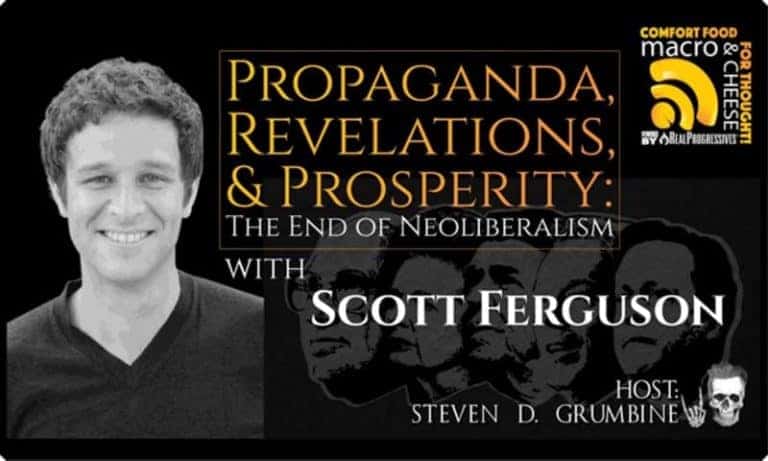Here in the Macro “n Cheese clubhouse, whenever we think we fully comprehend neoliberalism, a guest comes along with a whole new range of insights. Scott Ferguson is just that kind of guest. His main area of interest is culture and he makes some surprising observations about our ingrained misunderstanding of money and how it relates to politics, art, and our very experience of modern life. Neoliberalism isn’t just enmeshed in our aesthetic and popular culture, what we have is neoliberal culture. It is pure ideology: “the background assumptions and values that structure our innermost thoughts, feelings, and desires. What makes us laugh, what makes us cry, what makes us horny.”
Ferguson traces the roots of neoliberalism back through what he calls the “big L” liberalism of Adam Smith and the class warfare waged against the aristocracy by the merchant and industrial class. The “small L” liberalism of FDR and post WWII mid-century America played a role as well. By the 1970s, neoliberalism grew as a reaction to the gains made by the civil rights, labor, and anti-war movements. Power needed to be locked down and consolidated. The neoliberal narrative of scarcity flourished.
Money can be legitimately seen as our oxygen. It is the centralized medium that connects us to one another. But we don’t have a culture that affirms this view. In songs and films, money is related to greed and, whether this is seen as a positive or negative quality, it is always portrayed as a zero sum game. There must be winners and losers. This is as true of our popular culture as our political rhetoric.
Despite the enormity of the problem, Ferguson sees this as an exciting time. The current paradigm crisis is exposing cracks in the neoliberal foundation. Activist groups are aligning with the modern money movement and, for the first time in decades, rejecting the mythology of scarcity. The clarity of focus and purpose in proposals like the Green New Deal and the federal job guarantee can ultimately change the debate so it becomes about abundance rather privation.
Scott Ferguson is Associate Professor of Film and Media Studies in the Department of Humanities and Cultural Studies at the University of South Florida, Research Scholar at the Global Institute for Sustainable Prosperity, co-director of The Modern Money Network Humanities Division, and producer of the Money on the Left podcast.

